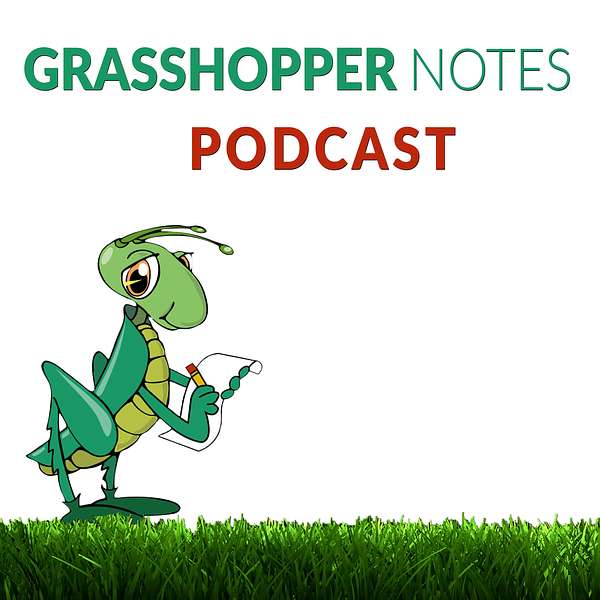
Grasshopper Notes Podcast
The Grasshopper Notes Podcast is hosted by John Morgan the man who has been billed as America’s Best Known Hypnotherapist.
John’s podcasts are a collection of guided meditations and bite-sized, mini podcasts which open you to new ways of thinking, communicating, and responding. You get a finer appreciation of how your mind works and how to use your internal resources to your best advantage.
See a video of John's background at the following link: https://www.youtube.com/watch?v=XbCPd00ok0I
In short, John Morgan is a people helper. Explore this channel and see what he can help you discover.
Grasshopper Notes Podcast
Don't Apologize
Use Left/Right to seek, Home/End to jump to start or end. Hold shift to jump forward or backward.
Do you look like your parents? Don't apologize! If you act like them, you may want to take some action. That's the topic of this mini podcast.
Grasshopper Notes are the writings from America's Best Known Hypnotherapist John Morgan. His podcasts contain his most responded to essays and blog posts from the past two decades.
Find the written versions of these podcasts on John's podcasting site: https://www.buzzsprout.com/1628038
"The Grasshopper" is the part of you that whispers pearls of wisdom that seem to pop into your mind from out of the blue. John's essays and blog posts are his interpretations of these "Nips of Nectar." Others have labeled his writings as timeless wisdom.
Most of the John's writings revolve around self improvement and self help. They address topics like:
• Mindfulness
• Peace of mind
• Creativity
• How to stay in the present moment
• Spirituality
• Behavior improvement
And stories that transform you to a wider sense of awareness that presents more options. And isn't that what we all want, more options?
John uploads these podcasts on a regular basis. So check back often to hear these podcasts heard around the world. Who wants to be the next person to change?
Make sure to order a copy of John's new book: WISDOM OF THE GRASSHOPPER – 21 Days to Creativity. These mini-meditations take you inside where all your creative resources live. And you'll come out not only refreshed but recommitted to creating your future.
It's only $16.95 and available at BLURB.COM at the link below. https://www.blurb.com/b/10239673-wisd...
Also, download John's FREE book INTER RUPTION: The Magic Key To Lasting Change. It's available at John's website https://GrasshopperNotes.com
Don't Apologize
The Grasshopper left this message in my Christmas stocking many years ago:
"Don’t apologize for having blue eyes."
I had to wipe the sleep out of my eyes before it started to make sense to me.
Chances are you resemble one of your parents or both. By and large, we're usually in denial about this for the first half of our life. The implication being: If I look like them, I must be like them.
In many instances, we're just like them. They’re who we learned from. Some of their qualities (good, bad, indifferent) stay with us for life, and other behaviors we learned from them, we outgrow.
As with any behavior, the key to outgrowing it is recognition. If you don’t know you have it, it’s difficult to do anything about it.
Looking like them is nothing you’ll ever have to apologize for. Short of plastic surgery, there’s nothing you can do about it; it happened without your permission.
Your behavior is an eye of a different color.Yes, you may have unwittingly sucked in their preferences, prejudices, and attitudes before you even knew what those words meant, but they’re your behaviors now. That means that you can’t blame your parents any more. You own these behaviors now. They're yours to apologize for.
Once we get over the shock of being like our parents in ways we never dreamed of, it’s time for a look in the mirror.
What behaviors do you own that you are or were critical of them for having? If you said, “None,” you're in denial.
The physical recognition, if it exists, dawns on most folks about midlife. The operative phrase that escapes from your mouth, without any pre-thought, goes something like this: “Oh my God, I look just like my mother/father.”
That’s the point where you want to go deeper and discover the behaviors that correspond to that resemblance.
If you inherited their big heart and sense of fairness, celebrate it!
If you got something that gets you a raised eyebrow, it’s time to own it and outgrow it.
Recognition is the wedge that goes between stimulus and response. It’s in that moment of suspension of your automatic behavior that you glimpse your free will – the will to be free of your inheritance.
All the best,
John
